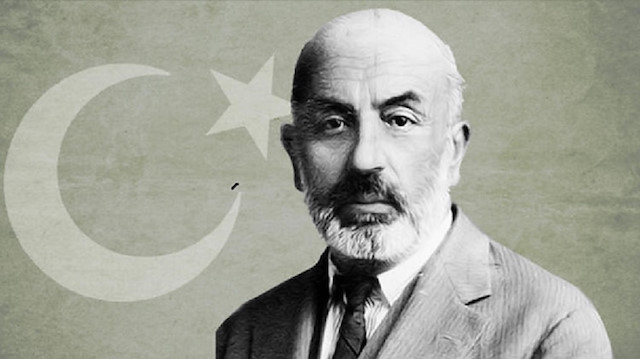
Mostly known as 'National Poet' in Turkey, Ersoy immortalized his nation's battle for survival in national anthem
The legacy of the Turkish author and poet of Turkey’s national anthem Mehmet Akif Ersoy lives on in the country, as Turkey commemorates the 82nd anniversary of his death.
Akif -- also was an academic and member of the parliament -- is mostly regarded in Turkey as the “National Poet”, since he was the writer of the lyrics of Turkish National Anthem -- the march of independence -- which was adopted in 1921 by the Turkish Grand National Assembly.
The Turkish-Albanian poet was born in 1873 during the Ottoman era in Istanbul's Fatih district.
His father Mehmet Tahir was an Albanian lecturer in the Fatih Madrasa in Istanbul and his mother Emine Serife was of Turkish-Uzbek origin.
Ersoy attended the Emir Buhari Primary School in Fatih.
During his education Ersoy also learned Arabic, Persian and French.
While he was attending the Mulkiye Idadisi high school, his father passed away in 1888 which is why he left school to provide for his family as they were facing poverty due to a fire in their neighborhood that destroyed their home.
Later, Ersoy started the Mulkiye Baytar Mektebi -- a veterinary school -- to find stable work, which he graduated with honors in 1893.
During his studies, his interest in poetry also grew.
It was the same year when he graduated and his first poem was published in a journal.
In 1898 Ersoy married to Ismet Hanim. The couple had three daughters and three sons, while one of his sons died when aged one-and-a-half years.
Ersoy worked as a teacher and continued to write poems. He became the editor-in-chief of "Sirat-i Mustakim", a weekly magazine published between 1908-1966, with a name change to ''Sebilürresad'' as of its 183rd issue.
His famous work Safahat, a collection of 44 poems in various lengths, was first published in 1911.
His poems were themed with social problems and religious issues.
In 1920, Ersoy was elected as the deputy of the Burdur province and entered the parliament.
Upon a special request by the then-Education Minister Hamdullah Suphi Bey, the poet penned the Istiklal Marsi (Independence March).
In the march, Ersoy immortalized his nation's battle for survival, in the wake of World War I, crowning its national liberation in 1921 during the Turkish War of Independence against foreign occupation.
Devoting all his efforts to the well-being of Turkish people through his poetry and his public speeches, Ersoy donated the monetary reward he received for his independence march to the charity.
On March 12, 1921, the Turkish Grand National Assembly officially declared Ersoy's poem as the national anthem.
Founded in 1923, the Republic of Turkey also adopted the poem as national anthem.
In 1925, Ersoy moved to the Egyptian capital Cairo where he taught Turkish language at a university.
After living for 11 years in Egypt, Ersoy returned to Istanbul in 1936 where he passed away in his apartment on Dec. 27 in the same year.
On Dec. 19, Turkish President Recep Tayyip Erdogan announced that the apartment of the Turkish poet -- located at Istanbul's famous Istiklal street -- will be turned into a museum.
Ersoy is remembered by the Turkish nation not only in every recitation of the National Anthem but also through his heritage of poems and memoirs.


